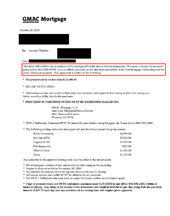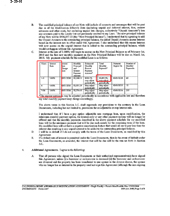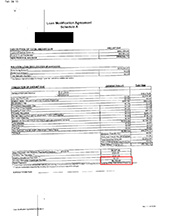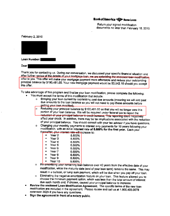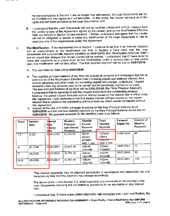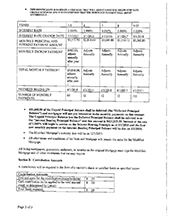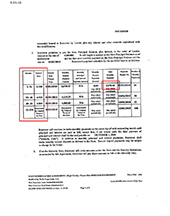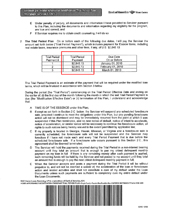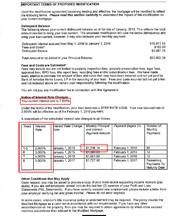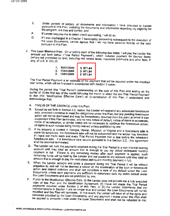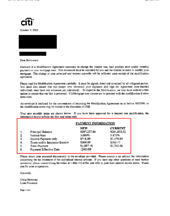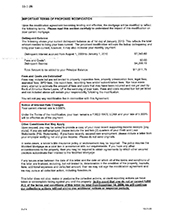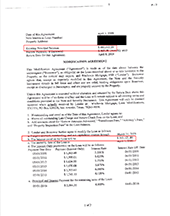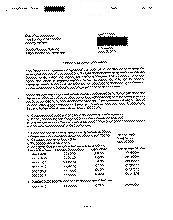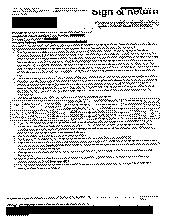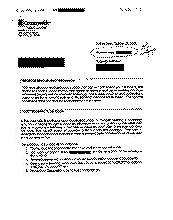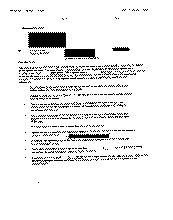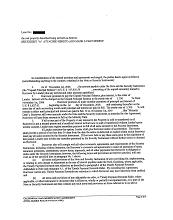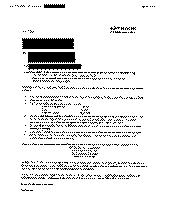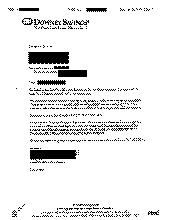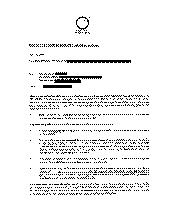To see the actual document sent to our clients please click on the thumbnail link. The list of results will continue to be updated with more results.
Another Successful Short Sale.
Over $100,000.00 Waved by the Bank!
The bank agrees to take
$100,000 less than the amount due
as full and final satisfaction.
Loan Provider: GMAC
Interest Rate Modified from
6.5% to 3.0%!
Interest rate reduced to a 3.0% ARM.
Max interest rate of 5.0% beginning
in 2016.
$287.00 reduction in monthly payments.
Loan Provider: Aurora Loan Services
Monthly Mortgage Payment
Reduction of $3836.73!
Interest rate reduced from 8.5% ARM
to 3.250% ARM with max rate of 5.01 starting in 2013.
$3836.73 reduction in monthly payments.
Loan Provider: AHMSI, inc.
Loan Principle reduction of
$190,481!
5.5% Fixed Rate for
the Life of the Loan!
Principal Reduction of $190,481
Interest rate reduction to 5.5%, fixed.
Term Length: 40 years.
Bank: Bank of America / Countrywide
Interest Rate Reduction to
2.125% ARM!
Interest rate reduced from 6.375%
to 2.125% ARM with max rate of 5.0
starting in 2017.
$298.15 reduction in monthly payments.
Loan Provider: ASC
Interest Rate Reduction to
2.0% ARM!
$815.35 Monthly Payment
Reduction.
Interest rate reduced from 7.550%
to 2.0% ARM with max rate of 5.05%
starting in 2018.
$815.35 reduction in monthly payments.
Loan Provider: Litton Loan Servicing
Interest Rate Reduction to
4.0% ARM!
$1893.12 Monthly Payment
Reduction.
Interest rate reduced from 6.125%
to 4.0% ARM with max rate of 6.125%
starting in 2015.
Loan Provider: Wells Fargo
Monthly Payments Reduced
35%!
Monthly payments reduced $1501.72
from $4,346.85 to $2,845.13
Loan Provider: Bank of America
$1307.06 Monthly Payment
Reduction!
Interest rate reduced from 7.5%
to 2.0% ARM maxing at 5%
in 2017.
Loan Provider: Bank of America
39% Reduction in Monthly
Payments!
Payments reduced from $1,605.74 to $973.26.
Interest rate reduced from 5.75% to
2% ARM.
Loan Provider: GMAC
Interest Rate Reduced to 3.0%
and $655.88 Monthly Payment
Reduction!
Payments reduced from $1,743.06 to $1,087.18.
Interest rate reduced from 5.875% to
3.0% ARM maxing at 5.0% in
November 2011.
Loan Provider: CITI Bank
Exploding ARM Loan Adjusted
to 5.0% Fixed for the Life of the Loan!
5.0% adjustable mortgage modified
to 5.0% fixed for life of the loan with
$70 monthly payment reduction.
Loan Provider: Bank of America
Client Savings of over $254,000!
$687 / Month Decrease in
Mortgage Payment!
Principal Reduction of $139,332
Interest Rate Reduction to 5.5%
Term Length of 40 Years
Bank: Wachovia Mortgage
Client Savings of over $138,710!
$1,267 / Month Decrease in
Mortgage Payment!
Principal Reduction of $71,462
Interest Rate Reduction to 5.0%
Term Length of 40 Years
Bank: Wachovia Mortgage
Client Savings of over $202,682!
$625 / Month Decrease in
Mortgage Payment!
Principal Reduction of $75,577 from second
Interest Rate Reduction to on first 3%
Term Length of 40 Years
Bank: IndyMac/HSBC Bank
$417,481 Debt Forgiven
in Short Sale!
No Liability!
Balance owed on Property of $591,481
Approved short sale amount: $174,000
Debt forgiven by bank: $417,481
Bank: Countrywide Home Mortgage
$94,316 Debt Forgiven
in Short Sale
No Liability
Balance owed on Property of $286,316
Approved short sale amount: $192,000
Debt forgiven by bank: $94,316
Bank: Washington Mutual Bank
Client Savings of over $574,452!
$1,773 / Month Decrease in
Mortgage Payment!
Original Payment: $3,600
Payment after Loan Modification: $1,827
Term Length of 40 Years
Bank: HSBC Bank USA
Client Savings of over $304,320!
$634 / Month Decrease in
Mortgage Payment!
Original Payment: $2,529
Payment after Loan Modification: $1,895
Interest Rate Reduction to 4.75%
Term Length of 40 Years
Bank: E*trade Financial
Client Savings of over $119,160!
$1,655 / Month Decrease in
Mortgage Payment!
Original Payment: $3,650
Payment after Loan Modification: $1,995
Interest Rate Reduction to 4.75%
Term Length of 40 Years
Bank: Downey Savings
$100,562 Debt Forgiven
in Short Sale
No Liability
Balance owed on Property of $492,001
Approved short sale amount: $391,439
Debt forgiven by bank: $100,562
Bank: OCWEN Loan Servicing LLC
We hold our clients privacy in the highest of confidence, in order to ensure their attorney/client confidentiality all clients names and property/mortgage inferences have been blacked out.
The results shown are not indicative of a result that you may receive as all cases and clients financial situations are different. We do not guarantee any results or that you will get a short sale approved, or principal reduction, etc. We no longer assist homeowners in contacting their lender for a loan modification. Be careful of any company or lawyer that gives you a guarantee as they are impossible to give as ultimately the final decision rests with the lender.
